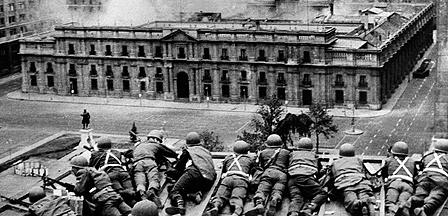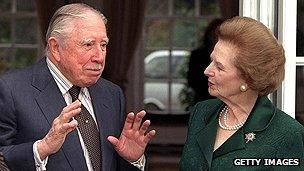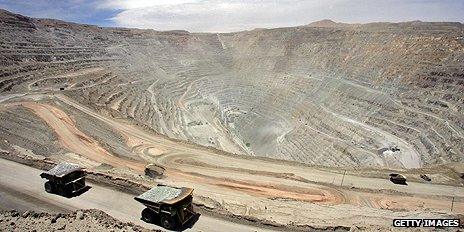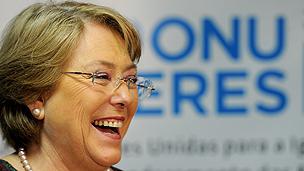Chile profile - Timeline
- Published
A chronology of key events:
1535 - Indigenous Araucanian people successfully resist first Spanish invasion of Chile.
1541 - Pedro de Valdivia begins Spanish conquest and founds Santiago.

The presidential palace comes under attack during the 1973 coup
1553 - Araucanians capture and kill Valdivia.
1810 - Junta in Santiago proclaims autonomy for Chile following the overthrow of the king of Spain by Napoleon.
1814 - Spain regains control of Chile.
1817 - Spanish defeated by Army of the Andes led by Jose de San Martin and Bernardo O'Higgins at the battles of Chacabuco and Maipu.
1818 - Chile becomes independent with O'Higgins as supreme leader.
1823-30 - O'Higgins forced to resign; civil war between liberal federalists and conservative centralists ends with conservative victory.
1851-61 - President Manuel Montt liberalises constitution and reduces privileges of landowners and church.
1879-84 - Chile increases its territory by one third after it defeats Peru and Bolivia in War of the Pacific.
Late 19th century - Pacification of Araucanians paves way for European immigration; large-scale mining of nitrate and copper begins.
1891 - Civil war over constitutional dispute between president and congress ends in congressional victory, with president reduced to figurehead.
1925 - New constitution increases presidential powers and separates church and state.
1927 - General Carlos Ibanez del Campo seizes power and establishes dictatorship.
1938-46 - Communists, Socialists and Radicals form Popular Front coalition and introduce economic policies based on US New Deal.
1948-58 - Communist Party banned.
1952 - Gen Carlos Ibanez elected president with promise to strengthen law and order.
1964 - Eduardo Frei Montalva, Christian Democrat, elected president and introduces cautious social reforms, but fails to curb inflation.
Pinochet dictatorship
1970 - Salvador Allende becomes world's first democratically elected Marxist president and embarks on an extensive programme of nationalisation and radical social reform.
1973 - Chief of Staff General Augusto Pinochet ousts Allende in coup and proceeds to establish a brutal dictatorship.
1988 - Gen Pinochet loses a referendum on whether he should remain in power.
1989-90 - Christian Democrat Patricio Aylwin wins presidential election; Gen Pinochet steps down in 1990 as head of state but remains commander-in-chief of the army.
1994-95 - Eduardo Frei succeeds Aylwin as president and begins to reduce the military's influence in government.
Pinochet's aftermath
1998 - Gen Pinochet retires from the army and is made senator for life but is arrested in the UK at the request of Spain on murder charges.
2000 March - British Home Secretary Jack Straw decides that Gen Pinochet is not fit to be extradited. Gen Pinochet returns to Chile.
Socialist Ricardo Lagos is elected president.

Pinochet, under house arrest, meets former British premier Margaret Thatcher
2000 onwards - Chilean courts strip Gen Pinochet of his immunity from prosecution several times, but attempts to make him stand trial for alleged human rights offences fail, with judges usually citing concerns over the general's health.
2002 July - Gen Pinochet resigns from his post as a lifelong senator.
2004 May - President Lagos signs a law giving Chileans the right to divorce, despite opposition from the Roman Catholic Church.
Manuel Contreras, former head of secret police, is jailed for 15 years over the disappearance and death of a journalist in 1974.
2005 May - 45 young soldiers perish in a blizzard, prompting calls for an end to compulsory military service.

Chuquicamata, the giant open-cast mine
2005 July - Senate approves changes to the Pinochet-era constitution, including one which restores the president's right to dismiss military commanders.
2005 December - Presidential elections. Socialist Michelle Bachelet gains the most votes but fails to win more than 50% support, forcing a second-round vote against conservative billionaire and former senator Sebastian Pinera.
Bachelet
2006 January - Michelle Bachelet wins the second round of presidential elections to become Chile's first woman president and the fourth consecutive head of state from the centre-left Concertacion coalition. She takes office in March.

Michelle Bachelet, Chile's first woman president
2006 August - Chile and China sign a free-trade deal, Beijing's first in South America.
2006 December - Pinochet dies.
2007 January - President Bachelet signs a decree allowing the morning-after contraceptive pill to be given to girls as young as 14 without their parents' consent.
2007 March - Ongoing protests in the capital Santiago over chaos following the introduction of a new transport system.
2007 June - Government agrees to pay compensation to the families of 12 victims of Pinochet.
Tensions with Peru
2008 January - Peru files a lawsuit at the International Court of Justice in a bid to settle a long-standing dispute over maritime territory with neighbouring Chile.
2008 May - Unexpected eruption of Chaiten volcano which has been dormant for 9,000 years. Authorities order complete evacuation of two towns in Patagonian region.
2008 September - Emergency declared in parts of southern Chile where eight people were killed in torrential rain and widespread flooding.
2008 October - Local elections signal that the political right, long out of office in Chile, may be gaining ground ahead of next year's presidential poll.
2009 February - President Bachelet makes the first visit to Cuba by a Chilean leader in almost four decades.
2009 October - Relations with Peru are strained further after Chile stages a military exercise in the north, close to the disputed border.
2009 November - A new diplomatic row erupts after a Peruvian air force officer is accused of spying for the Chilean military.
2010 January - Right-wing candidate Sebastián Piñera defeats former President Eduardo Frei in presidential election, ending 20 years of rule by the left-wing Concentracion coalition.
Earthquake
2010 February - Hundreds die and widespread damage is caused as massive earthquake strikes central Chile. The 8.8 magnitude quake is the biggest to hit the country in 50 years.
2010 March - President Piñera is inaugurated, and pledges to tackle the consequences of the earthquake.
2010 October - Thirty-three miners trapped deep underground for 69 days are winched to safety, watched by TV audiences around the world.
2010 December - President Piñera promises penal reform after a fire at an overcrowded Santiago jail claims the lives of 81 prisoners.
2011 May - Trade unions organise demonstration in Valparaiso in protest at government's environmental, education and labour policies.
2011 July - Thousands of high school and university students take to the streets to demand a more equal education system. Copper miners strike over government plans to restructure the industry.
2012 January - Government sparks row by changing designation of Gen Pinochet's government from "dictatorship" to "regime" in school textbooks.
2012 April - Congress passes much-debated anti-discrimination law, which names discrimination because of sexual orientation as an offence.
2012 December - A judge orders the arrest of eight former army officers over 1973 murder of well-known left-wing singer Victor Jara, who was killed only days after the coup that brought Gen Pinochet to power.
Bachelet returns
2013 April - Bolivia files a lawsuit against Chile at the International Court of Justice in The Hague to reclaim access to the Pacific Ocean. Bolivia lost access to the coastline in a 19th century war with Chile, leaving it landlocked ever since.
2013 May - Chile, Colombia, Mexico and Peru agree to scrap most of the tariffs on trade between their countries, hailing the move as an historic step towards regional integration.
2013 September - Body representing Chilean judges makes unprecedented apology for actions of its members under military rule in the 1970s and 1980s, saying judges failed to protect victims of state abuse.
2013 December - Left-wing candidate Michelle Bachelet wins second round of voting in presidential election.
2014 September - A blast in a packed Santiago metro station injures 14 people, in what the government terms an act of terrorism.
2014 October - Tens of thousands of parents march in protest against plans to phase out subsidised schools as part of President Michelle Bachelet's flagship education reform.
2014 November - Two retired Chilean colonels are sentenced to jail for torturing the father of President Michelle Bachelet in the months that followed the military coup led by General Augusto Pinochet in 1973.
A Chilean court orders the state to pay million of dollars of compensation to 30 former political prisoners who were held on a remote island in the extreme south of the country during the military rule of Augusto Pinochet.
2015 February - President Bachelet announces plans to end Chile's total ban on abortions.
2015 October - President Bachelet announces the creation of two new marine reserves in the South Pacific. One will be around Easter Island. Commercial fishing will be banned there.
Piñera returns
2017 November-December - Presidential election won by conservative former president Sebastián Piñera.
2019 October-November - Chile is rocked by mass protests at economic inequality, prompted by a subsequently-reversed rise in Santiago metro fares.
2020 October - A referendum backs rewriting the constitution, which was adopted during the rule of August Pinochet.